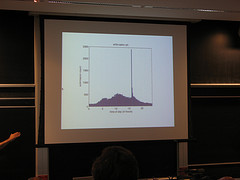helping you to navigate SciEng information
February 11th, 2010 by Kevin Lindstrom | No Comments »
BOULDER—Painting the roofs of buildings white has the potential to significantly cool cities and mitigate some impacts of global warming, a new study indicates. The new NCAR-led research suggests there may be merit to an idea advanced by U.S. Energy Secretary Steven Chu that white roofs can be an important tool to help society adjust to climate change.
Read the National Center for Atmospheric Research (NCAR) news release here. The full article published in Geophysical Research Letters can be read here.
Submitted by Kevin Lindstrom Liaison Librarian for Earth and Ocean Sciences
Posted in Atmospheric Science, Civil Engineering, Earth and Ocean Sciences, General Science, Geography, Mechanical Engineering, Physics | No Comments »
February 1st, 2010 by Eugene Barsky | No Comments »
This is a very interesting list showing the the top 20 institutions which attracted the highest total citations to their papers published in Thomson Reuters-indexed Engineering journals. These institutions are the top 20 out of a pool of 1,084 institutions comprising the top 1% ranked by total citation count in this field.
Must read – http://sciencewatch.com/inter/ins/10/10febTOP20ENG/
No Canadian institutions in the top twenty list…
Posted in Chemical and Biological Engineering, Civil Engineering, Main, Materials Engineering, Mechanical Engineering, Mining engineering, Science - undegraduate classes | No Comments »
January 26th, 2010 by Eugene Barsky | No Comments »

The Huffington Post had a post yesterday about some beautiful world libraries. Personally, I liked the Yale’s Rare books library…
For books on libraries architecture, please see this link – http://resolve.library.ubc.ca/cgi-bin/catsearch?subject=Library+architecture
** photo by http://www.flickr.com/photos/selva/
Posted in Amusing stuff, Civil Engineering, Main, Science - undegraduate classes | No Comments »
December 18th, 2009 by Kevin Lindstrom | No Comments »
There are currently two very useful journal rankings SCImago and JCR. These rankings allow you to display amongst other things the h-index for a specific journal or a grouping of journals based on subject
“The SCImago Journal & Country Rank is a portal that includes the journals and country scientific indicators developed from the information contained in the Scopus® database (Elsevier B.V.).” Scopus contains more than 15,000 journals from over 4,000 international publishers as well as over 1000 open access journals. There are also over 500 conference proceedings in the database.
For more information, go to SCImago
“Journal Citation Reports® is a comprehensive and unique resource that allows you to evaluate and compare journals using citation data drawn from over 7,500 scholarly and technical journals from more than 3,300 publishers in over 60 countries.”
JCR Science Edition contains data from over 5,900 journals in science and technology.
JCR Social Sciences Edition contains data from over 1,700 journals in the social sciences.
For more information, go to JCR (Journal Citation Reports)
It is important to be aware of the size of the body of literature (the number of journals and conference proceedings) being indexed in Scopus and Web of Science. Journals listed in JCR are indexed in the Web of Science The larger the database, the greater the possibility that articles will be discovered, read, and hopefully cited. This is especially important for open access journals, some of which have not yet been indexed in the Web of Science.
Eigenfactor ranking is based on Web of Science data.
Submitted by Kevin Lindstrom Liaison Librarian for Science and Engineering
Posted in Astronomy, Atmospheric Science, Chemical and Biological Engineering, Chemistry, Civil Engineering, Earth and Ocean Sciences, General Science, Geography, Materials Engineering, Mathematics, Mechanical Engineering, Mining engineering, News, Physics, Science - undegraduate classes, Statistics, Uncategorized, Wood Sciences | No Comments »
December 15th, 2009 by Eugene Barsky | No Comments »

NYT today has an article on an issue of great importance to all science disciplines – data management. The article – “A Deluge of Data Shapes a New Era in Computing” overviews the new book published by Microsoft researchers – “The Fourth Paradigm: Data-Intensive Scientific Discovery.”
The book is available in full text from Microsoft here – http://research.microsoft.com/en-us/collaboration/fourthparadigm/4th_paradigm_book_complete_lr.pdf
This is a hot issue in science libraries too, as we are trying to understand how to deal with the vast amounts of digital data and whether libraries have a role to play to support, maintain and archive some of this data…
** photo by http://www.flickr.com/photos/nickwheeleroz/
Posted in Astronomy, Atmospheric Science, Chemical and Biological Engineering, Chemistry, Civil Engineering, Earth and Ocean Sciences, General Science, Geography, Main, Materials Engineering, Mathematics, Mechanical Engineering, Mining engineering, Physics, Science - undegraduate classes, Statistics, Wood Sciences | No Comments »
December 11th, 2009 by Kevin Lindstrom | No Comments »
Ron Simmer Patent and IP Expert has once agained issued his Patex Bizarre Patents Calendar.
This calendar documents the creative spirt of the human race reflected in patents.
Check out Ron’s excellent site of patent and intellectual property links at the Patex website.
Submitted by Kevin Lindstrom Science and Engineering Liaison Librarian
Posted in Amusing stuff, Astronomy, Atmospheric Science, Chemical and Biological Engineering, Chemistry, Civil Engineering, Earth and Ocean Sciences, General Science, Geography, Main, Materials Engineering, Mathematics, Mechanical Engineering, Mining engineering, News, People, Physics, Podcasts, Science - undegraduate classes, Statistics, Teaching, Uncategorized, Wood Sciences | No Comments »
November 13th, 2009 by Kevin Lindstrom | No Comments »
Sociologist Joseph Hermanowicz’ new book Lives in Science How Institutions Affect Academic Careers describes how the prestige of academic institutions often shapes the career of the individual.
“For all but a handful of the scientists he studies, the prestige of their institution pretty much determines their professional–and even their personal–destiny. Of the more than 4000 institutions of higher learning in the United States where a scientist can get a faculty post–ranging from world-renowned research universities to local community colleges–only a very limited number possess the resources, reputation, and connections needed for research careers at the highest levels of recognition.”
Click here for a full review of Hermanowicz’ book.
Submitted by Kevin Lindstrom Physical Sciences and Engineering Liaison Librarian
Posted in Astronomy, Atmospheric Science, Chemical and Biological Engineering, Chemistry, Civil Engineering, Earth and Ocean Sciences, General Science, Geography, Main, Materials Engineering, Mathematics, Mechanical Engineering, Mining engineering, News, People, Physics, Science - undegraduate classes, Wood Sciences | No Comments »
November 12th, 2009 by Eugene Barsky | No Comments »
The newest issue of the Science has a short editorial titled “Becoming a Scientist“.
Personally, I found t his short piece to be very interested and not intuitive…take a look – http://www.sciencemag.org/cgi/content/full/326/5955/916?rss=1
Posted in Astronomy, Atmospheric Science, Chemical and Biological Engineering, Chemistry, Civil Engineering, Earth and Ocean Sciences, General Science, Geography, Main, Materials Engineering, Mathematics, Mechanical Engineering, Mining engineering, Physics, Science - undegraduate classes, Statistics, Wood Sciences | No Comments »
October 28th, 2009 by Eugene Barsky | No Comments »

Most of us spend our university education taking the standard, required courses, there are more than just the basics out there when it comes to some science classes.
This blog post list some of the most hilarious of them – http://www.onlineuniversities.com/blog/2009/10/100-hilarious-college-courses-that-really-exist/
Personally, I would love to take some of the science classes such as :
The Science of Superheroes: While it might sound like fun and games, this course takes superheroes as a means to teach students real lessons about physics. [U of California Irvine] or Lego Robotics: Legos can help you build more than just that TIE Fighter, they can also be used to make real robots, as this course will show students. [MIT]
** Photo by http://www.flickr.com/photos/jocorvera/
Posted in Amusing stuff, Astronomy, Atmospheric Science, Chemical and Biological Engineering, Chemistry, Civil Engineering, Earth and Ocean Sciences, General Science, Geography, Main, Materials Engineering, Mathematics, Mechanical Engineering, Mining engineering, Physics, Science - undegraduate classes, Statistics, Wood Sciences | No Comments »
October 7th, 2009 by Eugene Barsky | No Comments »

A new article today in the Journal of the American Society for Information Science could be of interest to those of you who post their studies to arxiv.org:
A. Haque and P. Ginsparg, “Positional effects on citation and readership in arXiv,” J. Am. Soc. Inf. Sci. Technol., vol. 60, pp. 2203-2218, 2009.
Abstract:
arXiv.org mediates contact with the literature for entire scholarly communities, providing both archival access and daily email and web announcements of new materials. We confirm and extend a surprising correlation between article position in these initial announcements and later citation impact, due primarily to intentional  self-promotion
self-promotion by authors. There is, however, also a pure
by authors. There is, however, also a pure  visibility
visibility effect: the subset of articles accidentally in early positions fared measurably better in the long-term citation record. Articles in astrophysics (astro-ph) and two large subcommunities of theoretical high energy physics (hep-th and hep-ph) announced in position 1, for example, respectively received median numbers of citations 83%, 50%, and 100% higher than those lower down, while the subsets there accidentally had 44%, 38%, and 71% visibility boosts. We also consider the positional effects on early readership. The median numbers of early full text downloads for astro-ph, hep-th, and hep-ph articles announced in position 1 were 82%, 61%, and 58% higher than for lower positions, respectively, and those there accidentally had medians visibility-boosted by 53%, 44%, and 46%. Finally, we correlate a variety of readership features with long-term citations, using machine learning methods, and conclude with some observations on impact metrics and the dangers of recommender mechanisms.
effect: the subset of articles accidentally in early positions fared measurably better in the long-term citation record. Articles in astrophysics (astro-ph) and two large subcommunities of theoretical high energy physics (hep-th and hep-ph) announced in position 1, for example, respectively received median numbers of citations 83%, 50%, and 100% higher than those lower down, while the subsets there accidentally had 44%, 38%, and 71% visibility boosts. We also consider the positional effects on early readership. The median numbers of early full text downloads for astro-ph, hep-th, and hep-ph articles announced in position 1 were 82%, 61%, and 58% higher than for lower positions, respectively, and those there accidentally had medians visibility-boosted by 53%, 44%, and 46%. Finally, we correlate a variety of readership features with long-term citations, using machine learning methods, and conclude with some observations on impact metrics and the dangers of recommender mechanisms.
** Photo by http://www.flickr.com/photos/easternblot/ – “Paul Ginsparg shows that everyone submits their paper to ArXiv *just* after the submission deadline so they’ll be the first on the front page the next day”
Posted in Astronomy, Atmospheric Science, Chemical and Biological Engineering, Chemistry, Civil Engineering, Earth and Ocean Sciences, General Science, Geography, Main, Materials Engineering, Mathematics, Mechanical Engineering, Mining engineering, Physics, Science - undegraduate classes, Statistics, Uncategorized | No Comments »
Older Posts »




 self-promotion
self-promotion by authors. There is, however, also a pure
by authors. There is, however, also a pure 